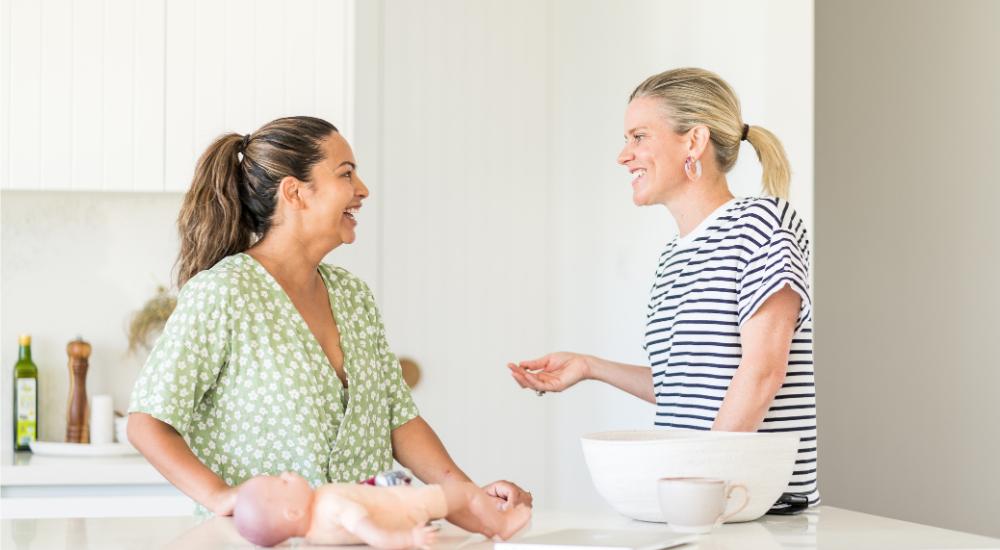Postpartum Mental Heath Check In
When it comes to postpartum mental health, one of the biggest messages that we need to spread is; it’s OK to not be OK. The first step, and oftentimes the hardest is admitting that you’re struggling and then asking for help.
It is estimated that approximately 1 in 10 women and 1 in 20 men experience either postnatal depression or anxiety. It’s far more common than we realise and yet the stigma around mental health means than many new parents still suffer in silence for far too long before getting the help they need and deserve.
In this post, I want to look at the symptoms of both postnatal anxiety and depression – knowing what’s ‘normal’ and what isn’t, as well as ways you can look after yourself (or someone in your life that is suffering) and where to get help.
When I speak about my two unique experiences of pregnancy, birth and early parenthood, I like to try and be as raw and real as possible. I hope that in some small way if another Mum reads my story and realises that even a midwife and second time mum can experience postnatal anxiety, that it can happen to anyone. Never in a million years did I imagine I’d find myself in that situation, especially as I’d adjusted to motherhood relatively well after I had Polly. Not to mention that I was a Midwife – I had this game sorted, right!? However, postpartum life was a completely different experience with my second born, Theo. You can read about both of my postnatal experiences here.
What is postpartum depression?
Postpartum depression can be characterised by the following feelings. Not everyone will feel all of these symptoms at once or may only experience some of them – the only way to know for sure is to be diagnosed by a healthcare professional but these are some signs that what you’re going through is more than just baby blues.
- Feelings of sadness, overwhelm and helplessness that don’t pass
- You feel as if you’ll never adjust to motherhood
- You don’t feel as though you’ve bonded with your baby
- Feeling numbness, emptiness or nothing at all
- Frequently feeling completely out of control or unexplained rage
- Giving up hope that you’ll ever feel normal, you feel like a failure
- Feeling anger or jealously towards your spouse of friends that don’t have children
- A deep sadness. Crying often for no reason at all
- Severe ‘brain fog’ that doesn’t ever seem to lift
- Having trouble sleeping or feeling like the only thing you want to do is sleep
- Zero appetite or feeling like food is the only thing that might make you feel better
- Feeling completely disconnected from everyone else around you, as though there is an invisible barrier that prevents you from connecting with others.
- Finding no joy in anything or not being able to ever imagine finding joy in things that you used to enjoy such as hobbies, family time, catching up with friends
- You fear that this is your new reality and that you’ll never have your old life back
- You feel unable to ask for help for fear of being seen as a bad mum or unfit to care for your baby
- Having thoughts of suicide, running away from it all or harming yourself
What is postpartum anxiety?
While everyone’s experiences are different, these are some common feelings and thoughts that people have when they’re suffering from postpartum anxiety. Remember, you don’t need to feel all or these things at once or all the time and you might only experience some of them.
- An inability to relax or quieten your mind – feeling as though your thoughts are constantly racing
- A constant and pervasive sense of worry, constantly asking yourself questions such as “am I doing this properly?” “is my baby eating enough?” “will my husband come home?” “will the baby wake up?”
- An inability to ‘switch-off’ and sleep
- You have scary and sometimes disturbing thoughts that you’ve not experienced before, and you feel afraid to be alone with your baby because of these thoughts
- You have no appetite and must force yourself to eat, an ever-present butterfly feeling that makes you feel as though you’re not hungry
- You’re experiencing physical symptoms such as shakiness, nausea, headaches or perhaps even panic attacks
- Feeling as though if you share how you’re truly feeling with others that they will judge you or take your baby off you
- You just have a ‘gut’ feeling that something is not right, you can’t put your finger on it exactly, but you know that you shouldn’t be feeling this way
Ways to look after yourself
The transition into parenthood is a huge life change; this is true for everyone even if you don’t necessarily feel like you’re struggling. Just acknowledge the fact that you’re experiencing huge physical and emotional changes is super important and will hopefully remind you that it is OK to take some time for yourself as well as ask for help.
Something that can be hugely beneficial is anticipating this change before bub is born and putting some systems in place to help and support you in those early weeks and months. Asking for help isn’t a sign of weakness and giving people a tangible way to help you can make them feel valuable and involved. If you do this before baby arrives, you won’t have to think about it or worry about having to ask.
Do you have a parent or family member who can drop off a home-cooked meal once a week (pot of soup, big lasagne, vegetable stew etc. something you can have ready-to-go or simply pop in the microwave)? Is there someone you ask to come and visit you once or twice a week – even something as simple as having someone watch the baby while you shower, get dressed and enjoy a cup of tea can make you feel like a new woman. Is there someone you can ask to give you a check-in call once or twice a week, without you needing to reach-out for some adult conversation?
Sleep is important for our mental health and wellbeing but is often one of the hardest things to get once bub arrives! Wherever possible, maximise your sleep quality and quantity. Although it can be hard with a baby, there are things you can do to improve the sleep that you do get such as limiting your exposure to blue-light 2 hours before going to sleep (phones, iPads and computer screens), minimising your caffeine intake or avoiding it entirely if you’re particularly sensitive, creating a relaxing bedtime routine that may include a warm bath or shower, reading a book or spending time with your loved one. It can be hard, there is no doubt, but any steps at all that you can take to improve your sleep will be beneficial.
Exercise is also another way to look after postpartum wellbeing. Exercise gives you a natural high thanks to a boost in serotonin levels. Everyone will be different in terms of fitness levels, getting the all-clear to exercise post-birth, what they enjoy and how much time they can find to exercise. However, even if it’s just a walk outside around the block in the fresh air and sunshine – getting out of the house and moving your body daily can be hugely beneficial for your mental wellbeing.
Another way you can look after yourself is by ensuring you’re getting a nutritious diet. Oftentimes, eating wholesome, fresh food is the first thing to slip for new parents and yet it is one of the most vital for overall wellbeing. While you may not be able to prepare home-cooked, nutritious meals for every single meal, every day – being mindful of eating fresh, whole food as often as possible is important. While you may feel like those biscuits or few squares (half a block then!) of chocolate with your cuppa, remind yourself how much better you’ll feel if you minimise processed, refined foods.
Finally, it’s important to give yourself a break from being ‘mum’ sometimes, even if it’s just for 15-20 minutes. Whether it’s reading a book alone in your bedroom when your partner gets home from work, having a bath on your own, going to the gym, meeting a friend for a coffee or watching a movie that makes you laugh, create micro-moments of me-time each day. Sure, there will be times where this feels impossible, but it’s so so important to practice self-compassion. Start doing this as soon as you can, don’t wait for burn out to set in. You can’t be in mum-mode 24/7 for weeks and months on end and expect to feel yourself… any amount of time where you can switch off will add up.
Where to get professional help
If you feel like the signs and symptoms as I’ve outlined above for postnatal anxiety and depression describe how you’re feeling, then it’s important to seek professional help.
The key thing to remember is this: even though you may feel incredibly alone and lost, you don’t have to suffer in silence. There is help and support available.
Speak to your GP who can refer you to the appropriate clinician in your area. There are doctors and psychologists who specialise in postpartum mental health, ask about who is best equipped to help you in your region.
Alternatively, there are several organisations whose mission it is to support women and their partners who are experiencing some form of perinatal and postnatal mental health illness. They not only provide resources and fact sheets but also offer hotlines, lists of service providers, early intervention programs and education.
https://gidgetfoundation.org.au/
Sometimes, it can also help to read other Mumma’s stories and experiences, particularly ones that share their recovery. It can help you realise that you’re not alone, that things can get better and importantly, that there is hope. This page has tonnes of personal stories http://postpartum.org/news-events/



